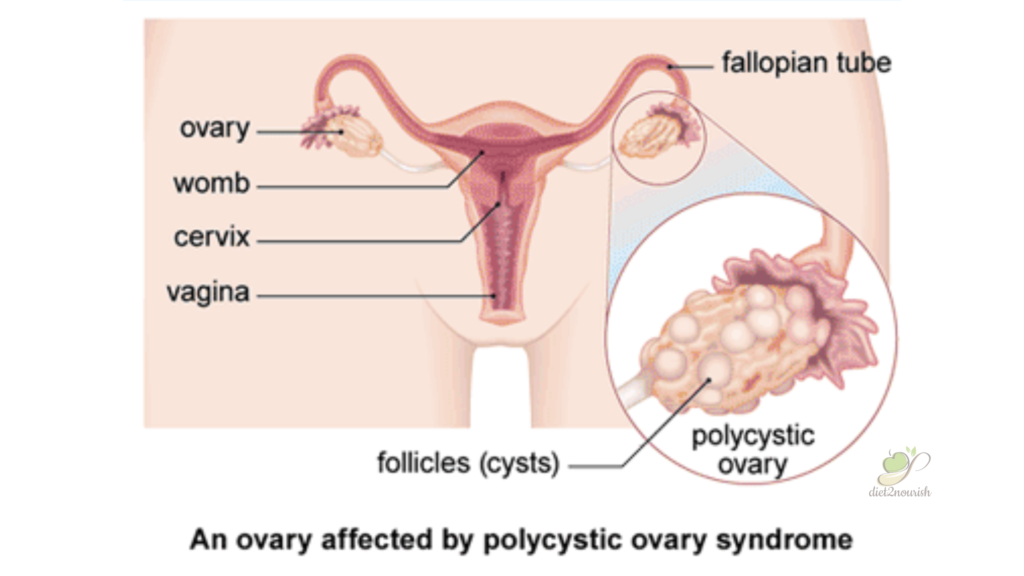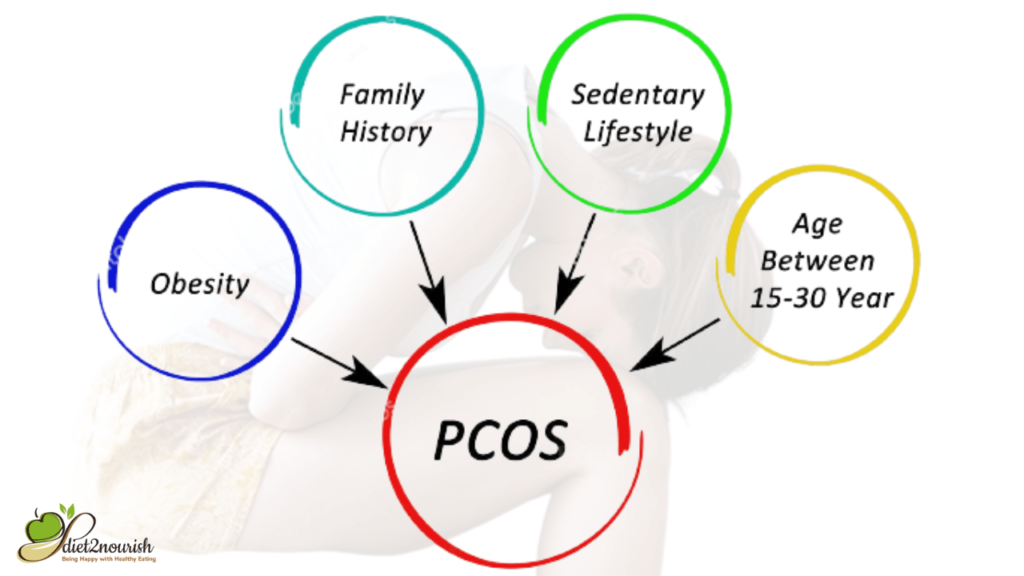How to Lose Weight with PCOS ?
“How to lose weight with PCOS?” It is one of the most asked questions by women struggling with PCOS.
Moreover, PCOS is a common hormonal disorder in women. Women with higher levels of male hormones are likely to get PCOS.
Furthermore, women having PCOS are at a higher risk of diabetes, sleep apnea heart disease, and uterine cancer.
PCOS also causes weight loss and obesity. With a little guidance and dietician advice you can shed a few kilos. In addition, get to know all about PCOS here!
What is PCOS?

PCOS is an abbreviation for polycystic ovary syndrome. This is a hormonal disorder which leads to the enlargement of ovaries and small cysts outside.
Moreover, PCOS can also be explained as a condition where a woman gets few or prolonged periods. The menstrual cycle gets interrupted.
Furthermore, PCOS is also associated with the production of an unusual amount of androgen from ovaries.
Known Causes of PCOS: polycystic ovary syndrome

There is no known cause of Polycystic ovary syndrome. Some of the causes are given and explained below:
Low-grade inflammation
Low-grade information refers to the response of white blood cells against infections and injuries. Research associates low-grade inflammation as a cause of this syndrome. In addition, it can also cause heart and blood vessel problems.
Heredity
Certain genes are known to be linked with polycystic ovary syndrome. Having a family history with PCOS can cause this condition in offspring.
Excess androgen
Androgen is a male hormone. Moreover, having too much androgen in the body interferes with the normal functioning of the ovaries. It also affects the ovulation process. In addition to this, it also causes irregular development and release of the egg.
Excess insulin
Insulin allows the cells to use sugar for their primary energy supply. However, if the cells become resistant to insulin, it can raise blood sugar levels.
Too much insulin can cause the body to produce more androgens. This causes polycystic ovary syndrome in women.
Science behind weight gain and Polycystic ovary syndrome
Yes, there is an established relationship between weight and PCOS. Polycystic ovary syndrome is accompanied by various hormonal issues like insulin resistance and hyperandrogenism.
Moreover, various metabolic issues combined with hormonal issues lead to weight gain. Women suffering from PCOS tend to put on more weight due to their metabolism. In addition, increased androgen production also contributes to this.
Why does PCOS cause weight gain?
Insulin is a hormone that is used to convert sugars and starches into energy. PCOS makes it difficult for the body to use insulin. Moreover, it creates a condition called insulin resistance. This can cause insulin, sugar or glucose to build up in the bloodstream.
Furthermore, high insulin levels cause an increase in androgens. High androgen levels in women lead to irregular periods, acne and most of all, weight gain.
What are the health risks due to PCOS related weight gain?
Weight gain is always troublesome because it is accompanied by numerous health problems. Regardless of the cause, weight gain takes a toll on health. PCOS is accompanied by weight gain in women.
Moreover, women suffering with polycystic ovary syndrome can encounter the following health conditions:
- Diabetes
- High blood pressure
- Acne
- High cholesterol
- Sleep apnea
- Infertility
- Endometrial cancer
- Various heart diseases
How to lose weight with PCOS using a nutritious diet?

The following are the best foods that you can include in your diet. Consuming them will help in losing weight while struggling with PCOS.
1) Food rich in fibre

The best thing about eating fibre-rich foods is that it keeps you full after a meal. Therefore, fibre-rich food helps in eating less and losing more. Moreover, studies reveal that a high-fibre diet is associated with low insulin resistance.
What are some good fibre-rich food options?
- Seeds like flax seeds, chia seeds and pumpkin seeds
- Fruits like apples, pears, peaches, raspberries etc
- Veggies rich in fibre like carrots, sweet potatoes etc.
- Dried fruits like almonds, prunes etc.
2) Protein-rich food

Not only does protein help in stabilising the blood sugar but also keeps you full after the meal. In addition, high protein intake helps in weight loss in women with PCOS.
Which food is rich in protein that helps in weight loss with PCOS?
Protein-rich foods that help to lose weight in PCOS are:
- Eggs
- Nuts
- Dairy
- Seafood
- Lean meat
3) Healthy fats
Healthy fats are always satiating. Since healthy fats are rich in healthy carbohydrates, they help in maintaining nutrient intake goals.
Furthermore, consuming healthy fats helps you in eating fewer calories. This eventually leads to weight loss with appropriate carbs included in the diet.
Which foods are rich in healthy fats?
Given below are some foods that are rich in healthy fats.
- Olive oil
- Coconut oil
- Nut butter
4) Fermented food
By fermented food, we mean healthy gut bacteria. It is very useful in weight maintenance and balanced metabolism. Moreover, studies revealed that people with PCOS have decreased concentration of healthy gut bacteria than normal people.
Where can I find beneficial gut bacteria?
You can find beneficial gut bacteria in the following fermented foods:
- Yoghurt
- Sauerkraut
- Tempe
- Kombucha
- Kimchi
- Kefir
Worst foods that you should avoid when trying to lose weight with PCOS

If you want to lose weight with PCOS, then you need to watch out for the following foods. They are unhealthy and will interrupt your weight loss journey.
1) Foods containing carbs
Carbohydrates have a direct impact on insulin. Therefore, you must decrease your carbohydrate intake in order to lose weight with PCOS.
Furthermore, consuming a low glycemic diet is the best option for people with PCOS. The glycemic index refers to the ability of how quickly a food can raise blood sugar levels.
In addition, low glycemic diets reduce insulin resistance and body fat in women with PCOS. This can further lead to obesity.
2) Processed foods
Processed foods are largely related to weight gain, regardless of the PCOS condition. Moreover, processed foods raise sugar levels and trigger insulin resistance. Eventually, it leads to weight gain and obesity. Processed foods undergo various processes that can further cause weight gain.
3) Foods containing added sugars
Sugars are directly linked with insulin. Consuming foods with added sugars raises the insulin level which further causes insulin resistance. It triggers weight gain and obesity. In addition to this, people with polycystic ovary syndrome process sugar in a different way than normal people.
Moreover, cutting down on sugar helps in managing weight and easing the symptoms of PCOS.
- red meat
How to lose weight with PCOS by using tips?
There are certain tips that can help you in losing weight quickly while struggling with PCOS.
1) mindful eating
Mindful eating is a process that increases awareness of internal eating cues. It helps in weight loss and is beneficial for people with PCOS. In addition, mindful eating is an approach which helps in fighting various bad eating patterns. Binge eating and emotional eating can be avoided through a mindful eating process.
2) Reduce inflammation
Certain foods trigger chronic inflammation in people with PCOS. These foods are mainly rich in sugar. Therefore, food rich in sugar causes inflammation and must be cut off from the diet.
In addition, there are some foods that help in reducing inflammation. They are omega-3 fatty acids, whole grains, fibre, rich foods and vegetables.
3) Lifestyle changes
There are certain lifestyle changes that help with constipation. Inducing such changes in your life will definitely be helpful.
● Proper sleep schedule
Research shows that lack of sleep is related to weight gain. Moreover, PCOS is often accompanied by sleep, disturbances like insomnia, excessive sleeping, sleep apnea etc.
● balanced diet
Eating a well balanced diet will nourish your body. Moreover, it will help with the bowel movements. So, focus on an adequate diet that is rich in fibre.
4) Regular Exercise
Regular exercise and body movements keep bowel movements regular. In addition to this, it is very necessary to exercise daily
5) Quit smoking
Smoking with polycystic ovary syndrome can be a bad decision. Even on a general basis, smoking is life-threatening. It must be avoided when struggling with PCOS. As it disturbs and interferes with the hormonal balance in the body.
The bottom line
If you are struggling with PCOS and find it hard to lose weight, then you are at the right place. With diet and a few lifestyle changes, you can share a few kilos and get back in shape.
PCOS is associated with weight gain. With an appropriate diet, people struggling with PCOS can lose weight and ease the symptoms.
Moreover, a nutritious diet that is low in carbs and sugars can do wonders. A balanced diet, rich in proteins, healthy carbs, and whole grains can keep the body nourished.
Frequently asked questions (FAQs)
Is PCOS reversible by diet?
Answer:
With appropriate changes induced in the diet, PCOS is a reversible condition. It is possible when dietary changes help in weight loss. Moreover, dietary changes also help in balancing the hormones and the reversal of PCOS symptoms.
Can PCOS cause faster weight gain in women?
Answer:
Yes, polycystic ovary syndrome is associated with faster weight gain in women. Moreover, women with PCOS are recorded to put on weight faster as compared to those who are not. Furthermore, PCOS is accompanied by insulin resistance and greater production of androgen. They contribute to weight gain in women.







